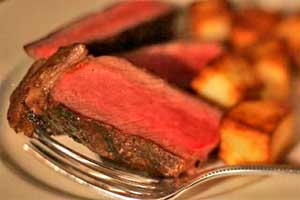Mom's beef puts son's sperm count at stake
By Thomas H. Maugh II, Times Staff WriterMen whose mothers ate a lot of beef during their pregnancy have a sperm count about 25% below normal and three times the normal risk of fertility problems, researchers reported Tuesday.
The problem may be due to anabolic steroids used in the United States to fatten the cattle, Dr. Shanna H. Swan of the University of Rochester Medical Center reported in the journal Human Reproduction. It could also be due to pesticides and other environmental contaminants, she added.
If the sperm deficit is related to the hormones in beef, Swan's findings may be "just the tip of the iceberg," wrote biologist Frederick vom Saal of the University of Missouri-Columbia in an editorial accompanying the paper.
In daughters of the beef-eaters, those same hormones could alter the incidence of polycystic ovarian syndrome, the age of puberty and the postnatal growth rate, he said.
"It's a small effect, but it is a significant effect," said Dr. Ted Schettler, an environmental health specialist at the Institute for Global Communications in San Francisco. "It's not surprising. The more you look at dietary factors, the more you turn up interesting information about how diet during pregnancy affects lots of aspects of human health."
Six growth-promoting hormones are routinely used in cattle production in the United States and Canada: the natural steroids estradiol, testosterone and progesterone, and the synthetic hormones zeranol, trenbolone acetate and melengestrol acetate. At slaughter, not all of these hormones have been metabolized.
Diethyl stilbestrol was also used in this country from 1954 to 1979, when it was banned after tests showed that minks fed chicken waste containing DES became infertile.
The Food and Drug Administration limits how much hormone residue is permissible in beef. Those limits may need to be reexamined if Swan's findings can be confirmed, Vom Saal said.
The use of these hormones in beef was banned in Europe in 1988, and the United States has disputed the EU's attempts to ban imports of U.S. beef containing hormones.
Studies in rodents have shown that even a trace of estrogen in the uterus from food can affect an offspring's sperm count, but no one has previously tried to study the question in humans.
Swan and her colleagues studied 387 partners of pregnant women in five U.S. cities, including Los Angeles. Each man provided a sperm sample and his mother filled out a questionnaire about her food consumption during pregnancy.
Swan concedes that women may have difficulty recalling their diets more than two decades earlier, but pregnancy may be an exception. "When you are pregnant, you are very aware of what you eat," she said.
The mothers were asked how often they ate beef and other meats. On average, they ate beef about 4– times per week, and other meats much less frequently.
They found that, in general, the more beef a woman ate, the lower her son's sperm count. For women who ate beef at least seven times a week, the son's sperm averaged 24.3% below normal. And even though those sons produced a pregnancy, they were three times as likely to have consulted a fertility doctor.
The researchers found no link to the mother's smoking, employment outside the home or the number of children she had. There was not enough data on other meats to reveal a potential association.
Schettler noted that there was room for a lot of inaccuracies in the mother's recall of her diet, "but what that tends to do is bias the study toward not finding anything. So the fact that she found [a relationship] was kind of a surprise to me."
The finding applies only to North American women, Swan said, because beef-producing practices vary widely elsewhere.
Swan emphasized that the study needs to be confirmed, adding that it is too soon to recommend that pregnant women not eat beef. But if a pregnant woman wants to be cautious, she said, she could switch to organic beef or other high-protein food.
BRITISH MEAT
BSE-CONTAMINATED INDEFINITELY?
HOME
Slaughterhouse
Colorectal Cancer
"The recipe for love"
British Meat and BSE
Low IQ Link to Eating Meat
Beef: The Recipe for Tapeworm
The British Medical Association
The Story Behind Our Last Meal
British Meat: the recipe for cancer
Red meat: the recipe for breast cancer
British chicken: the recipe for salmonella
BSE-infected American meat - a cover-up?
Reasons To Be Vegetarian (video advocating cruelty-free diet)

